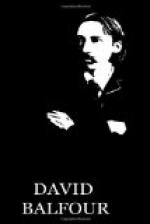It was some distance to that tavern. He talked all the way of matters which did not interest me the smallest, and at the door dismissed me with empty manners. Thence I walked to my new lodging, where I had not so much as a chimney to hold me warm, and no society but my own thoughts. These were still bright enough; I did not so much as dream that Catriona was turned against me; I thought we were like folk pledged; I thought we had been too near and spoke too warmly to be severed, least of all by what were only steps in a most needful policy. And the chief of my concern was only the kind of father-in-law that I was getting, which was not at all the kind I would have chosen: and the matter of how soon I ought to speak to him, which was a delicate point on several sides. In the first place, when I thought how young I was, I blushed all over, and could almost have found it in my heart to have desisted; only that if once I let them go from Leyden without explanation, I might lose her altogether. And in the second place, there was our very irregular situation to be kept in view, and the rather scant measure of satisfaction I had given James More that morning. I concluded, on the whole, that delay would not hurt anything, yet I would not delay too long neither; and got to my cold bed with a full heart.
The next day, as James More seemed a little on the complaining hand in the matter of my chamber, I offered to have in more furniture; and coming in the afternoon, with porters bringing chairs and tables, found the girl once more left to herself. She greeted me on my admission civilly, but withdrew at once to her own room, of which she shut the door. I made my disposition, and paid and dismissed the men so that she might hear them go, when I supposed she would at once come forth again to speak to me. I waited yet awhile, then knocked upon her door.
“Catriona!” said I.
The door was opened so quickly, even before I had the word out, that I thought she must have stood behind it listening. She remained there in the interval quite still; but she had a look that I cannot put a name on, as of one in a bitter trouble.
“Are we not to have our walk to-day either?” so I faltered.
“I am thanking you,” said she. “I will not be caring much to walk, now that my father is come home.”
“But I think he has gone out himself and left you here alone,” said I.
“And do you think that was very kindly said?” she asked.
“It was not unkindly meant,” I replied. “What ails you, Catriona? What have I done to you that you should turn from me like this?”
“I do not turn from you at all,” she said, speaking very carefully. “I will ever be grateful to my friend that was good to me; I will ever be his friend in all that I am able. But now that my father James More is come again, there is a difference to be made, and I think there are some things said and done that would be better to be forgotten. But I will ever be your friend in all that I am able, and if that is not all that . . . if it is not so much. . . . Not that you will be caring! But I would not have you think of me too hard. It was true what you said to me, that I was too young to be advised, and I am hoping you will remember I was just a child. I would not like to lose your friendship, at all events.”




